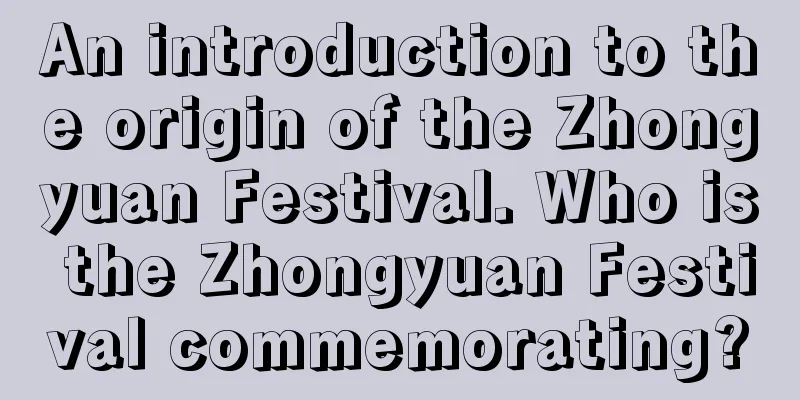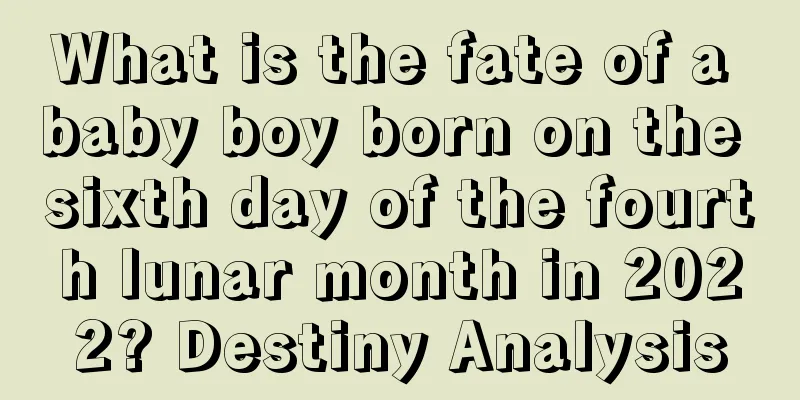An introduction to the origin of the Zhongyuan Festival. Who is the Zhongyuan Festival commemorating?

The Zhongyuan Festival is a traditional Chinese festival and has certain explanations and etiquette. So, let’s take a look at the origin of the Zhongyuan Festival. Who is the Zhongyuan Festival commemorating? It is the seventh month of the lunar calendar, when summer is not yet in full swing and autumn has arrived. The heat is gone and coolness is coming. One leaf can herald the coming of autumn. Shuimoxiansheng.com has compiled relevant knowledge about the days in the seventh month of the lunar calendar in 2020. Welcome to check out the special topic on the seventh month of the lunar calendar in 2020.Introduction to the Origin of the Ghost FestivalThe Zhongyuan Festival evolved from the ancient "Jiaoshe Festival". After the summer harvest, farmers hold ceremonies to worship the fields and ancestors during the slack season to thank the gods who manage the land and the ancestors who opened up the fields, which also means celebrating the harvest. In ancient times, the Zhongyuan Festival was only held on the 15th day of the seventh lunar month. A vegetarian banquet was offered for sacrifice, and it was stipulated that people could not stay overnight at other people's homes. Later, it developed from vegetarian food to non-vegetarian food, and from offering sacrifices to fields and ancestors to the salvation of "homeless ghosts". Probably because there were many epidemics and deaths in July in ancient times, some places also called July the "Ghost Month" and required memorial ceremonies, and the "Mid-July" thus evolved into the "Ghost Sending Away Festival."Who does the Ghost Festival commemorate?Buddhism: Commemorating Mulian’s rescue of his motherJuly 15th is also the Buddhist "Yulanpen Festival", which originated from the folk story "Mulberry Saves His Mother". According to the Buddhist "Yulanpen Sutra", after Mulian, one of the ten great disciples of Sakyamuni, was converted by Ksitigarbha, his mother acted recklessly, beating monks and cursing. The King of Hell was furious and sent her to hell to suffer. One day, Mulian traveled to hell and saw his mother turned into a hungry ghost. He was overwhelmed with sorrow, so he sent food to her. Unexpectedly, the food turned into flames before it even reached her mouth. Mulian was at a loss, so he prayed to Buddha for help. Buddha said, “Your mother’s sins were too deep in her lifetime. You cannot resolve them by your own strength. You must rely on monks from all directions. On the fifteenth day of July, prepare a hundred kinds of food and five kinds of fruits, place them in a basin, and hold a sacrifice together to feed the ghosts of all directions and liberate all the hungry ghosts. Only then can your mother be saved.” So Mulian acted according to Buddha’s will, and his mother was able to escape from the ghost path and ascend to heaven. The later Ullambana Festival came about because of the story of Mulian saving his mother. According to the Ullambana Sutra, the monks "formed a vow" in the temple on April 15th and chanted sutras and mantras for a total of ninety days, and then "ended the vow" on July 15th. July 15th is the day when all monks complete their merits. It is said that offerings made on this day can bring blessings a hundredfold. Buddhist people hold the "Ullambana Festival" on the 15th day of the seventh month, offering hundreds of delicacies and five kinds of fruits to the Sangha. They use the blessings they receive to accumulate merit for their living parents and to pray for the salvation of their deceased parents. In order to commemorate Mulian's filial piety, Buddhists hold a grand "Yulanpen Festival" every year, which is what we now call the "Ghost Festival". Taoism: Commemorating the Birthday of the Earth God In Taoism, the Zhongyuan Festival is mainly about promoting filial piety and encouraging good family practices. July 15th is the birthday of the God of Earth. The God of Earth pardons the sins of the Great Emperor Qingxu, whose name is Emperor Shun. He is the eighth-generation grandson of the Yellow Emperor. Because his biological mother died, his father remarried and his stepmother later gave birth to a son, Xiang. His father, stepmother and Xiang often harmed Shun, but Shun served his parents and treated his younger brothers with the same respect. He farmed in Lishan, fished in Lei Ze, and made pottery by the river. The people where he lived gathered together. In two years, a village was established, and in three years, a city was established. When he was twenty years old, he was famous for his filial piety. Therefore, the Zhongyuan Festival is also called the "Filial Son Festival". When this festival comes, every household kills chickens and pigs, worships their ancestors and ghosts in the underworld, and at the same time, they give alms to the Yin Gong, offer sacrifices to their ancestors, and then save the wandering ghosts, which is called "Zhongyuan Pudu". The destiny of each of us is different. Not everyone has good luck. Do you want to know what your destiny is? Then click on the exquisite calculation below. |
<<: Is the fifth day of the ninth lunar month in 2020 a suitable day for funerals?
Recommend
Will the Civil Affairs Bureau be open during the Dragon Boat Festival in 2022? Can I register for a marriage certificate?
Will the Civil Affairs Bureau be open during the D...
Is it auspicious to break ground today in 2020? What does it mean to start the plum rain season?
Introduction: Generally, it is necessary to choose...
What is the zodiac sign of a baby born on September 21, 2020, the day before the beginning of winter?
Introduction: It is the beginning of winter again,...
Is the ninth day of the twelfth lunar month in 2021 an auspicious day? Is it suitable for opening a business?
The twelfth month of the lunar calendar has arrive...
Lunar calendar June 16, 2019 auspicious time, good and bad time query
"After all, the scenery of West Lake in June...
Is it a good idea to pick up a car on the second day of the tenth lunar month in the Year of the Rat, 2020?
The tenth month of the lunar calendar is also cal...
Can I set up the bed on the tenth day of the tenth lunar month in 2021? Is the bed set up okay?
You also need to choose a time to set up the bed. ...
Is the sixth day of the third lunar month in 2022 an auspicious day? Is it a good day to set up the bed?
In the third month of the lunar calendar, peach bl...
What month is February in the lunar calendar? What is the lunar calendar?
Speaking of the second month of the lunar calendar...
Is January 1, 2020, New Year’s Day a good day? Check the auspicious and inauspicious events!
New Year's Day is the first day of the new yea...
2018 Torch Festival holiday arrangements and how many days
The Torch Festival does have a different meaning f...
Is August 24, the day before the autumnal equinox in 2019, a good date? Is it suitable for signing a contract?
Introduction: Contract signing usually requires se...
Check out the top ten bad Feng Shui factors around your home environment
Introduction: A good home environment is a harmon...
Can’t we have sex during the New Year? Will having sex on New Year's Eve offend the gods?
Speaking of rooming together, I believe many frien...
Can I move into my new home on the seventh day of the eleventh lunar month in 2020?
Can I move into my new home on the seventh day of...









